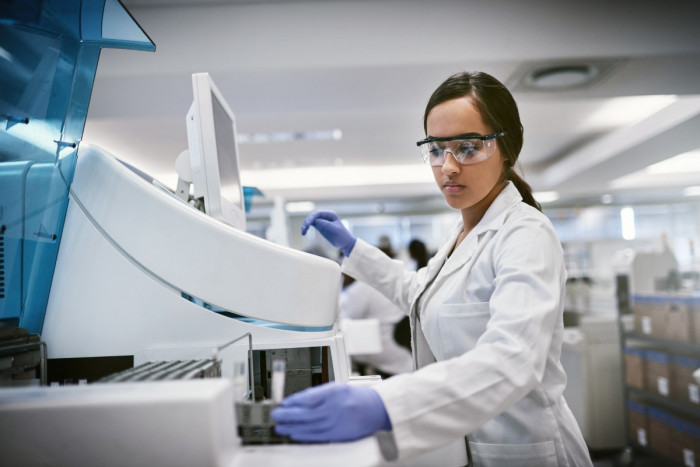Biochemist
Kairarau Matū Koiora
Alternative titles for this job
Biochemists study the chemical structure and function of animals, plants and micro-organisms such as bacteria and viruses. They use this research to develop medical, industrial and agricultural products.
Pay
Biochemists usually earn
$49K-$75K per year
Senior biochemists with PhDs usually earn
$76K-$130K per year
Source: BioTech New Zealand, 2019.
Job opportunities
Pay
Pay for biochemists varies depending on qualifications, experience and the type of work they do.
- Biochemists with Bachelor's degrees can expect to earn between minimum wage and $55,000 a year.
- Biochemists with Master's degrees usually earn $55,000 to $75,000.
- Senior biochemists who have PhDs can earn $76,000 to $94,000.
- With more responsibility and experience, biochemists can earn up to $130,000 or more a year.
Source: BioTech New Zealand, 2019.
- PAYE.net.nz website - use this calculator to convert pay and salary information
- Employment New Zealand website - information about minimum wage rates
(This information is a guide only. Find out more about the sources of our pay information)
What you will do
Biochemists may do some or all of the following:
- study the chemical make-up of living cells including genes, proteins and molecules
- study chemical processes such as cell development and disease
- study the effects of diseases or vaccines on living things
- develop and test new products such as medicines or ingredients
- write scientific reports and papers for journals
- manage laboratory teams.
Skills and knowledge
Biochemists need to have:
- knowledge of biology, chemistry and statistics
- knowledge of chemicals and their effects on living things
- skills in performing experiments and operating scientific equipment
- skills in researching, as well as interpreting and analysing research results
- maths and computer skills
- skills in writing grant proposals and funding applications.
Biochemists working at a senior level may also need team management skills.
Working conditions
Biochemists:
- usually work regular business hours but may work evenings or overtime to meet project deadlines
- usually work in laboratories and offices, but some may work in the field collecting samples or performing field trials
- may travel locally and overseas to attend workshops and conferences
- may be exposed to hazardous chemicals, diseases and body fluids, but only in carefully controlled and well-regulated facilities.
What's the job really like?

Mike Packer
Biochemist
Going green – making fuel from algae
Mike Packer's research at the Cawthron Institute in Nelson may change the way our cars are powered – he uses biochemistry and molecular biology to investigate renewable energy sources.
"I'm interested in hydrogen production from micro-algae. Algae have great potential for producing renewable energy because they grow so much faster than crops on land. The hydrogen they produce can be burnt in a fuel cell or internal combustion engine to drive cars."
Attracting funding a big part of the job
Mike's passion for this research helps him lead his team, mentor students, and interest prospective funders.
"Part of my role is to apply for money from government funding bodies, but also to apply to commercial partners for growing algae in different ways. I spend a lot of time writing grants and talking with potential investors.
"As a senior scientist, you end up managing a group of people to help you achieve your work. When you start to form your own lab, you are responsible for having many ideas, coordinating and feeding in other people's ideas, and attracting funding."
Entry requirements
To become a biochemist you need to have one of the following qualifications:
- Bachelor of Technology majoring in biochemistry
- Bachelor of Science
- Bachelor of Science and Technology.
Postgraduate qualifications, such as a Master's degree or PhD, are recommended for those wanting to enter research-based positions.
Secondary education
A tertiary entrance qualification is required to enter further training. NCEA Level 3 in maths, chemistry, physics and biology are recommended.
Personal requirements
Biochemists need to be:
- enquiring and observant
- self-motivated
- patient and detail-oriented
- creative and innovative
- good at problem solving
- good at writing and communicating
- good at planning and organising.
Some people think of science as hardened facts, but there's an artistic side as well. You need to have the creativity to be able to join the dots. And because the research I do is curiosity driven, you've got to have the self-motivation to try.

Mike Packer
Biochemist
Useful experience
Useful experience for biochemists includes:
- work with medicines or chemicals
- work as a science technician or medical laboratory technician
- other laboratory work
- experience writing reports.
Physical requirements
Biochemists need to have good eyesight (with or without corrective lenses) and good hand-eye co-ordination as they work with small amounts of substances.
Find out more about training
- Royal Society of New Zealand
- (04) 472 7421 - www.royalsociety.org.nz
What are the chances of getting a job?
Growing demand in health and biotechnology sectors
A global demand for new health products and solutions to environmental problems is increasing opportunities for biochemists.
Biochemists are needed in the health and wellness sector to develop:
- personalised medicine (medicines tailored to individual needs)
- veterinary medicines
- botanical medicines
- bioactive compounds (extracted from natural products such as milk and algae)
- biomaterials (natural or man-made materials used for medical applications).
Their skills are valued in the industrial and agricultural biotechnology sectors to develop:
- biofuels from waste products
- bioremediation (use of organisms to clean up polluted sites).
Chances best for biochemists with experience
Your chances of getting a job are best if you have:
- experience working in a laboratory or with experienced biochemists
- experience or skills in biotechnology, microbiology or genetics
- project management and business management skills.
Chances stronger in applied research programmes
Almost a quarter of job opportunities for biochemists are based around the universities in Auckland, Hamilton, Wellington, Christchurch and Dunedin.
More government funding is going into universities partnering with businesses to research solutions to global challenges such as improving water quality.
According to the Census, 72 biochemists worked in New Zealand in 2018.
Types of employers varied
More than a quarter of biochemists work for health organisations, such as hospitals or medical and animal diagnostic laboratories.
Other employers include:
- research institutes
- biotechnology, chemical or pharmaceutical companies involved in research and development
- universities
- food, dairy or brewing companies involved in product development
- government departments or regional councils.
Sources
- Champion, Z, executive director, BioTech New Zealand, careers.govt.nz interview, October 2019.
- NZ Herald, ‘Waikato biotech company Quantec inks long-term deal in China’, September 30, 2019, (www.nzherald.co.nz).
- Stats NZ, '2018 Census Data', 2019.
(This information is a guide only. Find out more about the sources of our job opportunities information)
Progression and specialisations
Biochemists may progress to senior positions from working as technicians, become project leaders or do postgraduate study to specialise in a particular research area. They may also move into biotechnology, food technology, medical sales or teaching roles.
Last updated 27 March 2025


